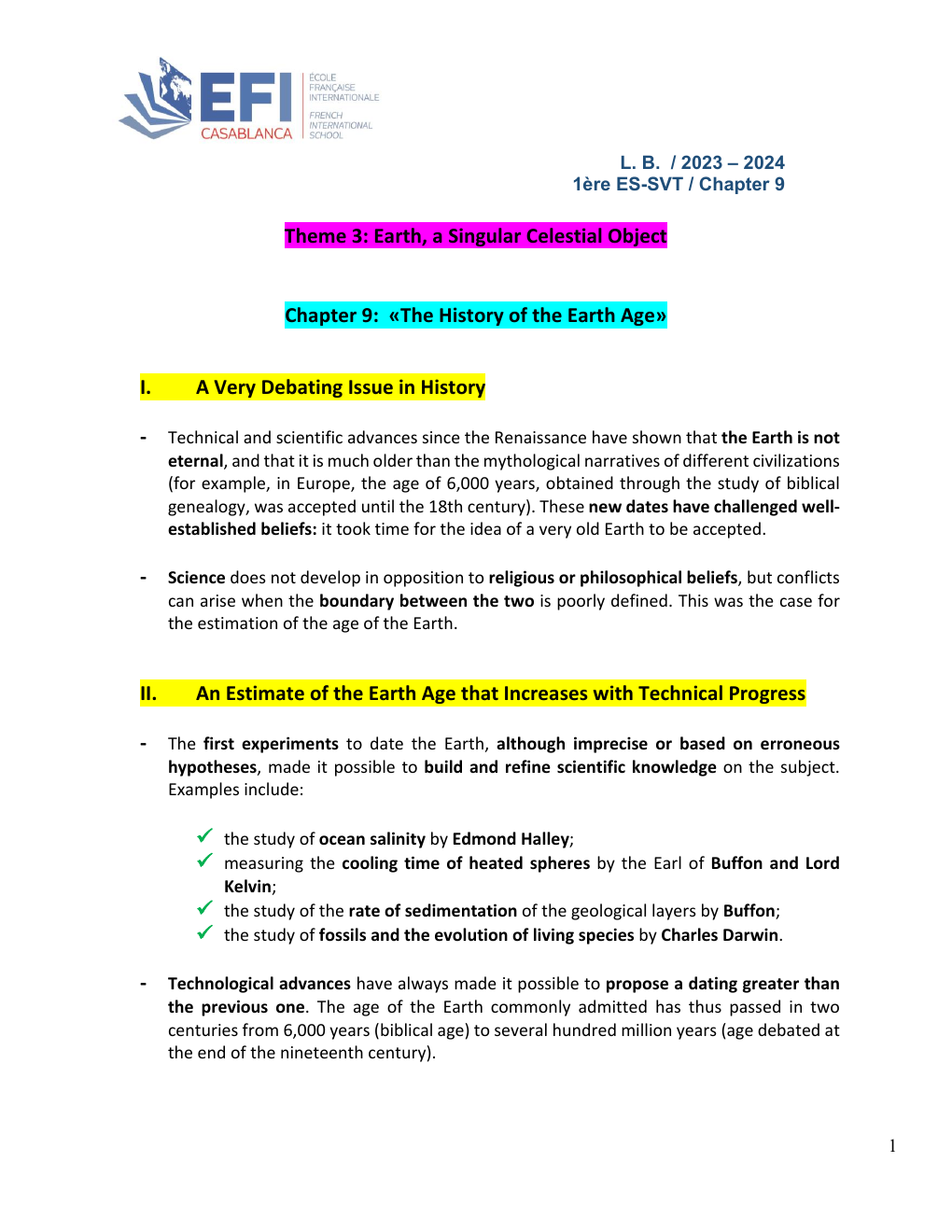ES Chapitre 9: Theme 3: Earth, a Singular Celestial
Publié le 25/03/2024
Extrait du document
«
Theme
3:
Earth,
a
Singular
Celestial
Object
Chapter
9:
«The
History
of
the
Earth
Age»
I.
A
Very
Debating
Issue
in
History
-‐ Technical
and
scientific
advances
since
the
Renaissance
have
shown
that
the
Earth
is
not
eternal,
and
that
it
is
much
older
than
the
mythological
narratives
of
different
civilizations
(for
example,
in
Europe,
the
age
of
6,000
years,
obtained
through
the
study
of
biblical
genealogy,
was
accepted
until
the
18th
century).
These
new
dates
have
challenged
well-‐
established
beliefs:
it
took
time
for
the
idea
of
a
very
old
Earth
to
be
accepted.
-‐ Science
does
not
develop
in
opposition
to
religious
or
philosophical
beliefs,
but
conflicts
can
arise
when
the
boundary
between
the
two
is
poorly
defined.
This
was
the
case
for
the
estimation
of
the
age
of
the
Earth.
II.
An
Estimate
of
the
Earth
Age
that
Increases
with
Technical
Progress
-‐ The
first
experiments
to
date
the
Earth,
although
imprecise
or
based
on
erroneous
hypotheses,
made
it
possible
to
build
and
refine
scientific
knowledge
on
the
subject.
Examples
include:
ü the
study
of
ocean
salinity
by
Edmond
Halley;
ü measuring
the
cooling
time
of
heated
spheres
by
the
Earl
of
Buffon
and
Lord
Kelvin;
ü the
study
of
the
rate
of
sedimentation
of
the
geological
layers
by
Buffon;
ü the
study
of
fossils
and
the
evolution
of
living
species
by
Charles
Darwin.
-‐ Technological
advances
have
always
made
it
possible
to
propose
a
dating
greater
than
the
previous
one.
The
age
of
the
Earth
commonly
admitted
has
thus
passed
in
two
centuries
from
6,000
years
(biblical
age)
to
several
hundred
million
years
(age
debated
at
the
end
of
the
nineteenth
century).
1
L.
B.
/ 2023 – 2024
1ère ES-SVT / Chapter 9
III.
The
Current
Dating
by
Radiochronology
-‐ Meteorites
were
formed
at
the
same
time
as
the
....
»
↓↓↓ APERÇU DU DOCUMENT ↓↓↓
Liens utiles
- bac physique: CHAPITRE 01 : NOMENCLATURE EN CHIMIE ORGANIQUE
- HISTOIRE – CHAPITRE 2 Les transformations politiques, économiques et sociales de la France de 1848 à 1870
- Chapitre 6 Engagement SES
- CHAPITRE 3 – La difficile entrée dans l’âge démocratique : la Deuxième République et le Second Empire Cours 1. La Deuxième République (1848-1852) : entre espoirs et échecs (p. 92-93)
- La Villa Savoye de Le Corbusier - devoir en architecture

































